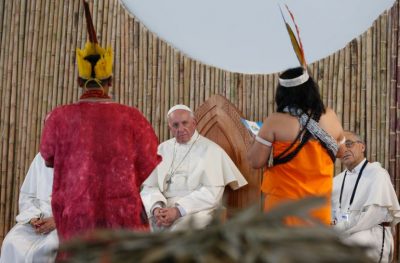
By Sarah Mac Donald - 18 June, 2019

Pic: Catholic News Service/NCR
The Vatican on Monday published the preparatory document for the forthcoming Synod of Bishops on the Amazon in which delegates are asked to study the possibility of priestly ordination for older married men.
The document, drafted after input from bishops’ conferences and local communities, contains proposals which potentially could see restricted ordination of older married men in a bid to meet the pastoral needs of remote communities in the Amazon.
The South American region covers parts of Bolivia, Brazil, Colombia, Ecuador, French Guiana, Guyana, Peru, Venezuela and Suriname. Its population of 2.8 million people consists of 400 indigenous tribes that speak some 240 languages. Currently it suffers from a chronic shortage of Catholic priests.
“While affirming that celibacy is a gift for the Church, it is asked that for the most remote areas of the region, the possibility of priestly ordination of elders, preferably indigenous, respected and accepted by their community, even those who already have stable and consolidated families, be studied in order to ensure the sacraments to accompany and sustain Christian life,” the preparatory document said.
The synod gathering, which takes place in Rome from 6 to 27 October next, will reflect on the theme ‘Amazonia: New Paths for the Church and for an Integral Ecology.’
Another proposal in the preparatory document which is up for discussion is giving women official decision-making roles.
The document said the Church should consider “an official ministry that can be conferred upon women, taking into account the central role they play in the Amazonian church.”
It also acknowledges that in the Church “the feminine presence in communities isn’t always valued.”
The 45-page document said that those who responded to a synod questionnaire asked that women’s “gifts and talents” be recognised and that the Church “guarantee women leadership as well as increasingly broad and relevant space in the field of formation: theology, catechesis, liturgy and schools of faith and politics”.
Writing for The Tablet, Christopher Lamb explained that the bishops attending the synod are being asked to look at how to “promote indigenous vocations of men and women in response to” the sacramental and pastoral needs of the people and to move from a “Church which visits” to a “Church which remains [present]” in the region.
He explained that many Catholic communities in the Amazon have to wait months to receive the sacraments from visiting priests.
Responding to the proposals in the Amazon Synod’s preparatory document, popular BBC broadcaster Fr Brian D’Arcy told CatholicIreland.net, “It’s important to move forward in small steps and to welcome such progress.
“In time it will lead to a broader acceptance and eventually to men and women when such a proposal becomes theologically feasible.”
Spokesman for the Association of Catholic Priests, Fr Brendan Hoban, told CatholicIreland.net, “Unfortunately as a Church we tend to make the most minimal possible change, whatever will solve the immediate problem.”
The Co. Mayo-based parish priest said the reality is that whatever is decided at the Synod will percolate into the wider Church.
“A dearth of leadership in our Church means that we tend to end up arriving breathless and late instead of foreseeing what’s being happening for years but blithely ignoring it in the hope it might go away. A Eucharistic famine is just around the corner, though it has been obvious for years,” he warned.
Professor Tina Beattie of Roehampton University’s Department of Catholic Studies told CatholicIreland.net, “It has long been rumoured that the issue of married priests might be raised in the context of the Amazon synod.
“I give cautious welcome to this pastorally motivated initiative which recognises the needs of the community in considering the possibility of ordaining married men, albeit in certain carefully circumscribed contexts.”
However, she stressed, “There are already many married Roman Catholic priests as a result of some leaving the Church of England over the issue of women priests, and joining through the Ordinariate.”
She added that it was good to see calls for women to be more fully included in leadership, theological education and decision-making processes.
“But we have heard time and again over the last 30 years the hierarchy paying lip service to this with very little substantial change in institutions and structures.
“I hope that this signals the shift to a more active commitment to promote women at all levels of Church life. There is a reference to the need to identify ‘the type of official ministry that can be given to women’”.